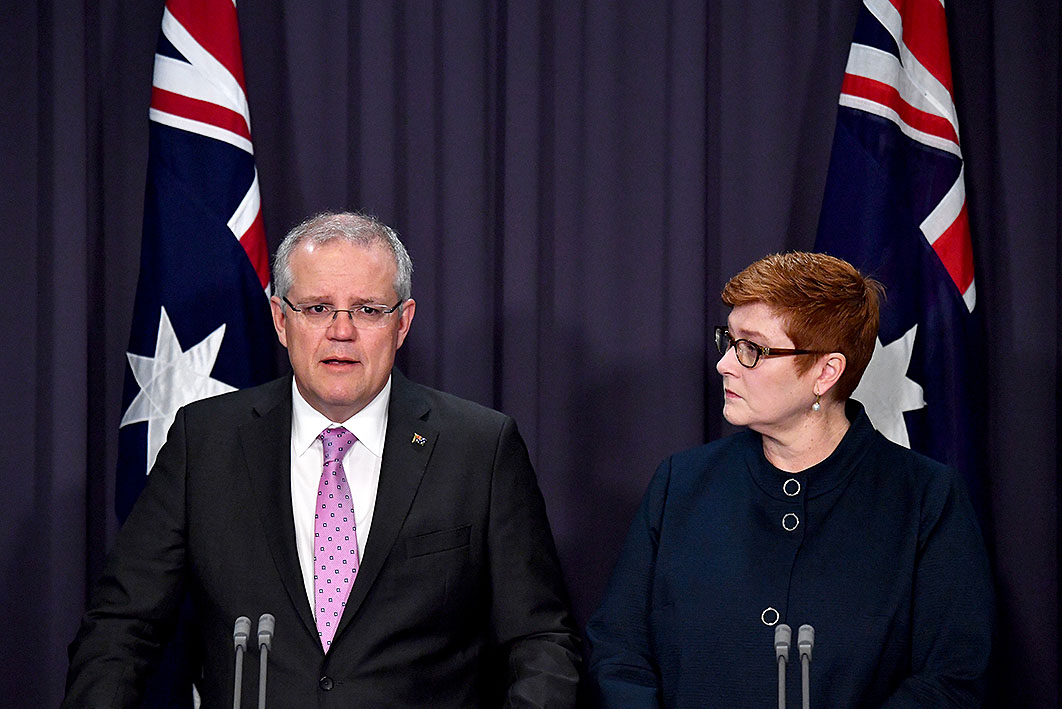Most commentary on Scott Morrison’s idea that Australia should follow Donald Trump’s embassy from Tel Aviv to Jerusalem and reconsider our support for the Iran nuclear deal has focused on tomorrow’s Wentworth by-election. The Sydney Morning Herald’s Peter Hartcher, for instance, described the move as a “stupid as well as irresponsible” attempt to target the 12 per cent of Wentworth voters who identify as Jewish — voters who, he implied, are already rusted on to the Liberal candidate and former ambassador to Israel, Dave Sharma.
Tempting as it is to believe that Morrison is prone to thought bubbles, that might not be the whole story.
First, what “Jewish vote”? Jewish voters, like other religious people, consider many issues before they vote. A senior Wentworth rabbi last week reminded his congregation to take account of the “moral issue of climate change” when casting their votes — hardly a ringing endorsement of a Liberal candidate.
Second, we shouldn’t assume that the prime minister’s signalling is all about Jewish voters, let alone Wentworth. Conservative Christians are also in the mix.
A few days earlier, the prime minister, who attends a Pentecostal church, had offended those Coalition members and senators who think that “religious freedom” means defending the right of religious schools to expel gay kids — in the memorable phrasing of former Australian Christian Lobby managing director Jim Wallace — “in the most loving way.”
In agreeing to bring a bipartisan end to religious schools’ exemptions from anti-discrimination law for LGBTIQ children, Morrison effectively conceded that gender identity and sexual orientation are part of a person’s make-up rather than a disorder or a set of behaviours that can be prayed away. The Australian Christian Lobby hasn’t conceded any such thing.
Morrison may well have felt that he needed to do something fast to show he is still the Christian right’s man. Praying on megachurch stages is a start, but policy signals also help.
In Righteous Gentiles: Religion, Identity, and Myth in John Hagee’s Christians United for Israel, published last week, Sean Durbin (whose PhD I supervised) analyses an important undercurrent of the Christian right, known as Christian Zionism. Durbin shows that America’s largest pro-Israel organisation is, in fact, made up of evangelical and Pentecostal Christians, led by megachurch pastor John Hagee.
When Donald Trump moved America’s Israel embassy to Jerusalem, the cheer squad was only partly Jewish. The ceremony was blessed by two Christian pastors, one of them being Hagee, the founder of Christians United for Israel, who believes that Jerusalem is “the preordained capital of Christ’s 1000-year empire.”
For these conservative Christians, identifying with Israel is a means of attaining God’s blessing, for themselves and for their nation. For politicians, the blessings are more immediate: appeals to an important Christian constituency.
In a chapter on “the eternal enmity of God’s enemies,” Durbin points out another reason for this new-found “philo-Semitism” among many conservative Christians in the United States: a common post-9/11 distrust of Islam. Morrison’s other recent pro-Israel thought bubble — a reconsideration of Australia’s support for the Iran nuclear deal — has a similar appeal.
The power of the US Christian right is well documented; Australia’s version is far from a potentially election-swaying critical mass. Intra-party politics, however, is another matter.
Durbin studied US Christian identification with Israel through church-organised, pastor-led tourism to Israel. The tours encourage participants to develop a sense of spiritual affinity with Israel and to “bless” (that is, give money to) Israel, to the degree that they have become important to the Israeli economy.
Australian megachurches offer something similar. For example, Metro Church on the Gold Coast offers the Israel 2019: Treasures of Grace tour, led by that federal Liberal frontbencher and lavish internet user, assistant treasurer Stuart Robert, for $5800.
To Christian-right party colleagues spooked by the announcement about religious exemptions for schools, the PM’s thought bubbles act as a reassurance. He has shown he cares. Observers of US politics call this kind of coded gesture to a specific religious constituency “narrowcasting.” In Morrison’s variety of politics, they call it “virtue signalling.” •




